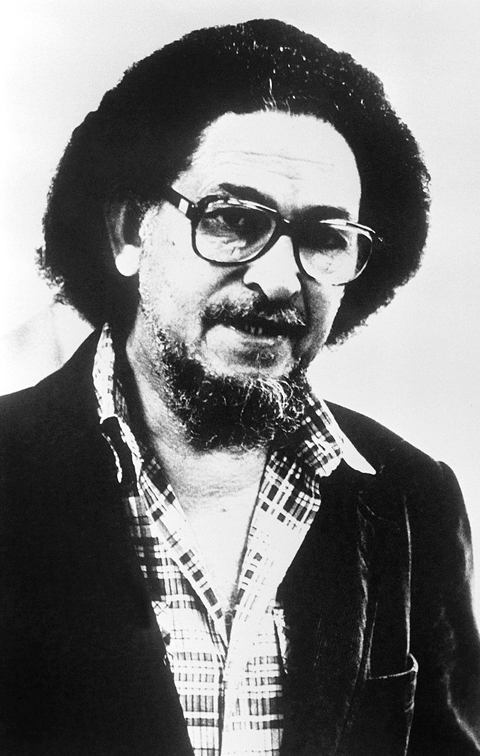When Dennis Brutus heard the news, he was breaking stones on Robben Island, the notorious prison colony where Nelson Mandela, the freedom fighter and future South African president, occupied the cell next to his.
The news was that the International Olympic Committee had suspended South Africa from the 1964 Olympics in Tokyo.
That signified a victory for Brutus, who led the fight to use sports as a weapon against the racist policies of South Africa. Ultimately, South Africa was barred from almost all international athletic competitions, including the Olympics, from 1964 to 1991.

PHOTO: AFP
Brutus paid a high price for his sports activism. Besides imprisonment, he was exiled and shot in the back. A poet, teacher and journalist, he was barred from earning a living except by menial labor.
He died in Cape Town on Dec. 26 at the age of 85. His son Anthony told the South African Press Association, a news agency, that he had had prostate cancer.
There were many others from many countries who fought apartheid in sports, but Brutus helped ignite the fight, and his efforts led to big victories.
In 1995, after apartheid — the official system of racial discrimination — had crumbled, it was a sporting moment that symbolized the birth of a new democracy in South Africa. It happened during the rugby World Cup tournament, from which the country had been barred, when it was being held in Johannesburg, and Mandela, then the president, appeared at the stadium wearing the green-and-gold jersey of the country’s team, which until recently had been all white, as a symbol of national unity. (The moment is re-enacted in the film Invictus, with Morgan Freeman playing Mandela.)
‘HATED SYMBOL’
“Brutus has a distinction that makes him a hated symbol to the white rulers of South Africa, and a heroic one to the critics of their regime,” Anthony Lewis wrote in the New York Times in 1983. “He has actually succeeded in bringing about some change in one aspect of apartheid.”
Dennis Vincent Brutus was born on Nov. 28, 1924, in Salisbury, Southern Rhodesia (now Zimbabwe), to South African parents who moved back home to Port Elizabeth when he was four. Of African, French and Italian ancestry, Brutus was classified under South Africa’s racial code as “colored.”
He graduated from the University of Fort Hare in South Africa, taught in nonwhite schools, did social work and joined the underground campaign against apartheid.
A mediocre athlete himself as a youth, Brutus turned to sports politics after seeing black athletes turned down for South Africa’s international teams in favor of inferior whites. He took up the issue not as a tactic to attack the apartheid system, he said, but because of the personal harm the policy was doing to athletes.
In 1959, Brutus helped form the South African Sports Association as founding secretary. It began by lobbying all-white sports organizations to change voluntarily, but made no progress.
In 1962, he helped form a new group to challenge South Africa’s official Olympic Committee. The organization, the South African Non-Racial Olympic Committee, of which he was president, persuaded Olympic committees from other countries to vote to suspend South Africa from the 1964 and 1968 Olympics.
In 1970, the group gathered enough votes from national committees, particularly those in Africa and Asia, to expel South Africa from the Olympic movement.
For Brutus, it would be a painful road to Barcelona, where a South African team, an integrated one, returned to the Olympics in 1992.
A paper prepared by apartheid opponents for the UN in 1971 said: “Dennis Brutus, one of the most persistent campaigners against racialism in sport, became a special target of the South African regime.”
In 1960, he was barred from meeting with more than two people outside his family. When he met with a Swiss journalist and others three years later, he was sentenced to 18 months in prison.
But he jumped bail and fled to Mozambique, where the Portuguese secret police arrested him and returned him to South Africa. There, while trying to escape, he was shot in the back at point-blank range.
After only partly recovering from the wound, Brutus was sent to Robben Island, where he was imprisoned for 16 months, five in solitary confinement. On his release he was ordered not to leave his home for five years. But after a year, he made a deal to emigrate to Britain on the condition he not return to South Africa.
Four years later, Brutus moved to the US, where he taught at Northwestern University and the University of Pittsburgh. He continued to work on South African sports issues, speaking out against General Motors’ involvement in South Africa in 1970 and returning to Britain in 1971 to protest the Lawn Tennis Association’s decision to allow South African tennis players to compete at Wimbledon.
US PERSECUTION?
In a highly publicized case, US immigration authorities tried to deport Brutus in the early 1980s because he lacked proper residence documents. In an opinion article in the Times in 1982, Henry Louis Gates Jr, then a Yale literature professor, suggested that Brutus was being persecuted by the administration of then-US president Ronald Reagan for his race and leftist politics. The administration said it was simply following standing policies.
Brutus won political asylum in the US after a judge ruled he would be in danger if returned to South Africa.
Brutus is survived by his wife, the former May Jaggers; two sisters; eight children; nine grandchildren; and four great-grandchildren.

The 2025 International Federation of Bodybuilding and Fitness (IFBB) Mr Universe Chinese Taipei competition began yesterday at Xinzhuang Gymnasium in New Taipei City, with more than 150 athletes showcasing their physiques. It is the first time in 16 years that the IFBB has held a competition in Taiwan, the last being the 2009 World Games in Kaohsiung. The professional bodybuilding contest is bringing together athletes from Taiwan and 16 other countries, including Malaysia, Japan, the US, France and Mexico. IFBB Chinese Taipei president Hsu An-chin said in an interview yesterday that the event came to Taiwan thanks to his lobbying efforts at last

Shohei Ohtani on Wednesday homered for the fifth consecutive game, tying a Los Angeles Dodgers franchise record. Yankees star Aaron Judge was the last player to homer in five consecutive games, accomplishing that feat last year. Ohtani, who leads the National League with 37 home runs, homered in the first inning off Minnesota Twins starter Chris Paddack. He hit a slow curveball 134m to center. He carried the bat midway down the first-base line and then did a bat flip. He did not hit a home run later in the game with the Dodgers trailing, but his presence was felt. With two outs

Ben O’Connor won Thursday’s monster Alpine stage to the ski resort of Courchevel as three-time Tour de France champion Tadej Pogacar responded to attacks from Jonas Vingegaard and dropped him to cement his grip on the yellow jersey. With just three stages left before the race ends in Paris, Pogacar looks poised to retain his title, with a comfortable lead of more than 4 minutes over Vingegaard, a two-time champion. Stage 18 featured three extremely difficult ascents, including the 26.4km climb of the Col de La Loze to the finish. At 2,304m, La Loze is the highest summit in this year’s Tour. Two

US top seed Taylor Fritz dropped an early yesterday morning marathon to Alejandro Davidovich-Fokina of Spain, while the UK’s Emma Raducanu and Canada’s Leylah Fernandez reached the semi-finals of the ATP and WTA DC Open. World number four Fritz, two points from victory in the ninth game, dropped the last five games in falling to the 26th-ranked Spaniard 7-6 (7/3), 3-6, 7-5 after three hours and five minutes in a match ending just before 2am. Davidovich-Fokina advanced to the semi-final against US fourth seed Ben Shelton, who beat sixth-seeded hometown hero Frances Tiafoe 7-6 (7/2), 6-4. Fritz, who had 20 aces and six